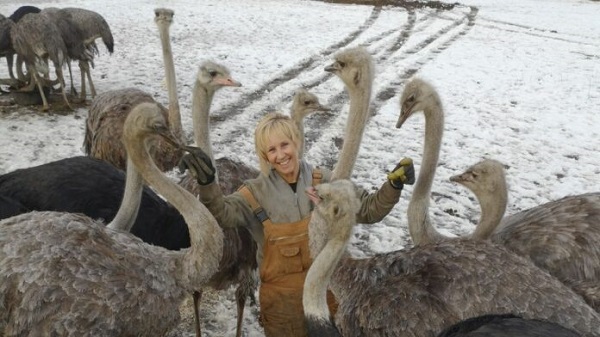Agriculture
Cranberries: the bitter berry that offers a sweet taste of success

Cranberries: the bitter berry that offers a sweet taste of success
Cranberries have been a staple at family gatherings ever since Indigenous people introduced the bitter berry to European colonists in the 15th century. Now they warm the hearts of millions of Canadians, especially during Thanksgiving and Christmas.
Quebec’s cool climate and short growing season allow organic cranberries to thrive in the region.
Cranberries are traditionally sweetened and cooked or dried to reduce some of their tartness so they won’t leave a bitter taste in your mouth. For many Quebec producers, the bitter berry offers a sweet taste of success.
North American cranberry harvesting began in the early 18th century and has developed over the years to the point where Quebec cultivated acreage now includes more than 10,145 acres, of which 3,944 acres are organic. With one-third of Quebec’s production being organic, the province is now the global leader in organic cranberry production. The province scores second for non-organic production after Wisconsin, United States.
The cranberry industry has faced several challenges in the last decade. The most significant challenge has been oversupply leading to price pressures for growers. Despite profitability challenges, Quebec cultivated acres climbed 79 per cent between 2009 and 2019, reaching 65 per cent of the total Canadian production. In 2019, British Columbia accounted for 29 per cent of the Canadian market and Ontario and the Atlantic provinces round out the cultivated acres in Canada.
Cranberry cultivated acres in Quebec and British Columbia
Source: Statistics Canada
The productive bogs in B.C. are challenged by the mild winters, which makes weed control a constant battle. However, when all conditions are favourable, B.C. produces a high-quality berry.
Cranberries can be eaten in many forms: fresh, dry, in sauce, jam, juice or in capsules. The demand for organic dried cranberries is strong. A consensus among producers is the growth prospects are good and acres are expected to increase year over year, but at a slower pace than in the last decade.
Vincent Godin, cranberry producer in Quebec, co-owner of Emblem Cranberry and president of the Quebec Cranberry Growers Association, said he expects the 2020 crop to be a bit lower than in the past two years in terms of volume, but it’s normal as cranberry plants produce more berries in the second year of a two-year production cycle.
“The stock is low too in the U.S. and in Canada so it should be good on the price producers will get this year,” he said. “With the climate change in the U.S., Quebec becomes the ideal region for the production of cranberries. The future is bright for our sector here.”
“To produce cranberries, it takes sand, water, a lot of patience, deep pockets and a strong business plan,” said Pierre-Étienne Parent, Farm Credit Canada (FCC) senior relationship manager who specializes in cranberry operations financing. “It may take five years for a new cranberry field to be productive. The key to success resides in the soil preparation and smart management of the critical harvest period. This is a large-scale and unique production that we should be very proud in Canada.”
“In France, doctors have started prescribing cranberry capsules combined with reduced doses of antibiotics to fight various infections,” said Godin. “Who knows, cranberries may soon be part of the Canadian medical repertoire and not just Thanksgiving and Christmas meals.”
Why eat cranberries?
- They are an excellent source of vitamin C and support good bone health. In fact, a daily consumption of 115 ml of fresh cranberries satisfies the daily need of vitamin C for an adult.
- This fruit is entirely void of sodium and contains very little sugar or protein.
- The anti-adhesive properties of cranberries have positive effects on urinary tract, ulcers, gums and dental plaque.
- They have amazing infection-fighting properties, especially for fighting urinary tract infections in women.
- A regular intake of cranberry products may reduce the risk of recurring infections by up to 40 per cent and, in turn, reduce the need for antibiotic treatment.
This story is reproduced with permission from FCC.
About FCC
FCC is Canada’s leading agriculture and food lender, with a healthy loan portfolio of more than $38 billion. Our employees are dedicated to the future of Canadian agriculture and food. We provide flexible, competitively priced financing, management software, information and knowledge specifically designed for the agriculture and food industries. As a self-sustaining Crown corporation, we provide an appropriate return to our shareholder, and reinvest our profits back into the industries and communities we serve. For more information, visit fcc.ca.
Agriculture
Canada Greenlights Mass Culling of 400 Research Ostriches Despite Full Recovery from Bird Flu Months Ago

 Nicolas Hulscher, MPH
Nicolas Hulscher, MPH
Federal court upholds CFIA’s reckless cull order—setting a dangerous precedent for the unscientific mass depopulation of genetically important animals.
In March, I interviewed Katie Pasitney of Universal Ostrich and Connie Shields to discuss the alarming implications of the Canadian Food Inspection Agency (CFIA) order to cull 400 research ostriches at Universal Ostrich Farm in British Columbia over bird flu:
Canada Orders Mass Culling of 400 Research Ostriches Over Bird Flu, Refuses to Test Surviving Birds for Natural Immunity
·The Canadian Food Inspection Agency (CFIA) has ordered the culling of 400 ostriches at Universal Ostrich Farm in British Columbia, citing concerns over H5N1 bird flu. However, this decision is not based on sound science and could have serious consequences for both food security and medical research.
Universal Ostrich Farm is a research facility focused on studying the unique antibody-producing capabilities of ostriches. Their research has demonstrated potential in neutralizing viruses, bacteria, and even COVID-19, making it an important contribution to medical science.
In December 2024, the CFIA claimed that two deceased ostriches—which had been lying outside for over 16 hours—tested positive for H5N1 via PCR testing. Just 41 minutes after receiving these results, the CFIA signed an order to cull the entire flock.
The CFIA initially granted the farm an exemption, recognizing the birds as “genetically important.” Later, without clear justification, they reversed this decision, ordering their destruction.
Despite the importance of this research, the CFIA has refused to conduct further testing on the birds and has banned the farm from conducting its own tests, under threat of heavy fines and possible imprisonment. Why is the Canadian government refusing to study the potential antibodies ostriches have developed against H5N1 bird flu?
On January 31, 2025, a court granted a temporary stay of execution, halting the cull. However, the CFIA is appealing this decision, which means the culling could still proceed.
Today, we have received news that the reckless mass cull order will proceed despite their ostriches having already recovered months ago and developed natural immunity against H5N1:

Official Announcement: Federal Court Decision in Universal Ostrich Farms Inc. v. Canadian Food Inspection Agency
Dear friends and supporters,
We are absolutely devastated to share today’s Federal Court decision, issued on May 13, 2025. The court ruled in favour of the Canadian Food Inspection Agency (CFIA), upholding their order to destroy our beloved ostriches and rejecting our plea to save them.
The court’s decision accepted the CFIA’s justification under the Health of Animals Act and their use of the Stamping-Out Policy, which mandates the destruction of animals to control disease outbreaks, regardless of their health status. The court confirmed the CFIA’s approach, prioritizing trade obligations over the welfare of our animals.
In addition, we’ve been ordered to pay $15,000 in CFIA’s legal costs. You can read the full decision here: (2025 FC 878). https://saveourostriches.com/wp-content/uploads/2025/05/JR-T-294-25-and-T-432-25-Final.pdf
We are heartbroken by this outcome and uncertain about the future of our farm. As we navigate this incredibly difficult time, we ask for your patience and continued support. If you are able, please consider making a donation to help us manage the financial and emotional toll this has taken.
Thank you,
Universal Ostrich Farm
http://SaveOurOstriches.com
This deeply misguided decision sets a dangerous precedent for the Canadian government to recklessly depopulate animals at will.
By upholding the CFIA’s reckless cull order, despite the ostriches’ recovery and natural immunity, the court has prioritized trade protocols over scientific inquiry, animal welfare, and the advancement of life-saving medical research.
Epidemiologist and Foundation Administrator, McCullough Foundation
www.mcculloughfnd.org
Please consider following both the McCullough Foundation and my personal account on X (formerly Twitter) for further content.
Agriculture
Canada is missing out on the global milk boom

This article supplied by Troy Media.
 By Sylvain Charlebois
By Sylvain Charlebois
With world demand soaring, Canada’s dairy system keeps milk producers locked out of growth, and consumers stuck with high prices
Prime Minister Mark Carney is no Justin Trudeau. While the team around him may be familiar, the tone has clearly shifted. His first week in office signalled a more data-driven, technocratic approach, grounded in pragmatism rather than ideology. That’s welcome news, especially for Canada’s agri-food sector, which has long been overlooked.
Historically, the Liberal party has governed with an urban-centric lens, often sidelining agriculture. That must change. Carney’s pledge to eliminate all interprovincial trade barriers by July 1 was encouraging but whether this includes long-standing obstacles in the agri-food sector remains to be seen. Supply-managed sectors, particularly dairy, remain heavily protected by a tangle of provincially administered quotas (part of Canada’s supply management system, which controls prices and limits production through quotas and tariffs to protect domestic producers). These measures stifle innovation, limit flexibility and distort national productivity.
Consider dairy. Quebec produces nearly 40 per cent of Canada’s milk, despite accounting for just over 20 per cent of the population. This regional imbalance undermines one of supply management’s original promises: preserving dairy farms across the country. Yet protectionism hasn’t preserved diversity—it has accelerated consolidation.
In reality, the number of dairy farms continues to decline, with roughly 90 per cent now concentrated in just a few provinces. On our current path, Canada is projected to lose nearly half of its remaining dairy farms by 2030. Consolidation disproportionately benefits Quebec and Ontario at the expense of smaller producers in the Prairies and Atlantic Canada.
Carney must put dairy reform back on the table, regardless of campaign promises. The sector represents just one per cent of Canada’s GDP, yet
wields outsized influence on policy, benefiting fewer than 9,000 farms out of more than 175,000 nationwide. This is not sustainable. Many Canadian producers are eager to grow, trade and compete globally but are held back by a system designed to insulate rather than enable.
It’s also time to decouple dairy from poultry and eggs. Though also supply managed, those sectors operate with far more vertical integration and
competitiveness. Industrial milk prices in Canada are nearly double those in the United States, undermining both our domestic processors and consumer affordability. These high prices don’t just affect farmers—they directly impact Canadian consumers, who pay more for milk, cheese and other dairy products than many of their international counterparts.
The upcoming renegotiation of CUSMA—the Canada-United States-Mexico Agreement, which replaced NAFTA—is a chance to reset. Rather than resist change, the dairy sector should seize the opportunity to modernize. This includes exploring a more open quota system for export markets. Reforms could also involve a complete overhaul of the Canadian Dairy Commission to increase transparency around pricing. Canadians deserve to know how much milk is wasted each year—estimated at up to a billion litres—and whether a strategic reserve for powdered milk, much like our existing butter reserve, would better serve national food security.
Global milk demand is rising. According to The Dairy News, the world could face a shortage of 30 million tonnes by 2030, three times Canada’s current annual production. Yet under current policy, Canada is not positioned to contribute meaningfully to meeting that demand. The domestic focus on protecting margins and internal price fairness is blinding the sector to broader market realities.
We’ve been here before. The last time CUSMA was renegotiated, Canada offered modest concessions to foreign competitors and then overcompensated its dairy sector for hypothetical losses. This created an overcapitalized industry, inflated farmland prices and diverted attention from more pressing trade and diplomacy challenges, particularly with India and China. This time must be different: structural reform—not compensation—should be the goal.
If Carney is serious about rebooting the Canadian economy, agri-food must be part of the conversation. But that also means the agriculture sector must engage. Industry voices across the country need to call on dairy to evolve, embrace change and step into the 21st century.
Dr. Sylvain Charlebois is a Canadian professor and researcher in food distribution and policy. He is senior director of the Agri-Food Analytics Lab at Dalhousie University and co-host of The Food Professor Podcast. He is frequently cited in the media for his insights on food prices, agricultural trends, and the global food supply chain.
Troy Media empowers Canadian community news outlets by providing independent, insightful analysis and commentary. Our mission is to support local media in helping Canadians stay informed and engaged by delivering reliable content that strengthens community connections and deepens understanding across the country.
-

 International23 hours ago
International23 hours agoIsrael’s Decapitation Strike on Iran Reverberates Across Global Flashpoints
-

 Business1 day ago
Business1 day agoTrump: ‘Changes are coming’ to aggressive immigration policy after business complaints
-

 illegal immigration1 day ago
illegal immigration1 day agoLA protests continue as judge pulls back CA National Guard ahead of ‘No Kings Day’
-

 Business2 days ago
Business2 days agoThe carbon tax’s last stand – and what comes after
-

 National2 days ago
National2 days agoCarney promotes MP instrumental in freezing Freedom Convoy donors’ bank accounts
-

 Health2 days ago
Health2 days agoRFK Jr. appoints Robert Malone, Martin Kulldorff, other COVID shot critics to overhauled CDC vaccine panel
-

 Business2 days ago
Business2 days agoOur addiction to dairy supply management is turning Canada into a trade pariah
-

 Alberta2 days ago
Alberta2 days agoOil prices are headed for a hard fall








